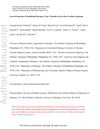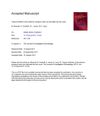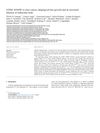 11 citations,
March 2020 in “American Journal of Medical Genetics Part A”
11 citations,
March 2020 in “American Journal of Medical Genetics Part A” A mutation in the EDNRA gene causes Oro-Oto-Cardiac syndrome, affecting face and heart development.
 11 citations,
October 2017 in “Journal of Investigative Dermatology”
11 citations,
October 2017 in “Journal of Investigative Dermatology” Applying certain inhibitors to the skin can promote hair growth without harming cells.
 11 citations,
April 2013 in “Journal of Proteomics”
11 citations,
April 2013 in “Journal of Proteomics” Found different proteins in balding and non-balding cells, giving insight into hair loss causes.
 10 citations,
January 2021 in “Journal of Ginseng Research”
10 citations,
January 2021 in “Journal of Ginseng Research” Red ginseng oil may help grow hair and protect skin from UVC light.
 10 citations,
October 2020 in “Frontiers in Cell and Developmental Biology”
10 citations,
October 2020 in “Frontiers in Cell and Developmental Biology” Wounds can regenerate hair in young mice, but this ability declines with age, offering insights for improving tissue regeneration in the elderly.
 10 citations,
May 2020 in “Dermatology Research and Practice”
10 citations,
May 2020 in “Dermatology Research and Practice” Proteoglycans are important for hair growth, and a specific treatment can help reduce hair loss.
 10 citations,
June 2016 in “Wound Repair and Regeneration”
10 citations,
June 2016 in “Wound Repair and Regeneration” The microenvironment, especially mechanical forces, plays a crucial role in hair growth and could lead to new treatments for hair loss.
 10 citations,
January 2016 in “PLOS ONE”
10 citations,
January 2016 in “PLOS ONE” Researchers found 44 proteins that change during different hair growth stages and may be important for hair follicle function.
 10 citations,
January 2016 in “Elsevier eBooks”
10 citations,
January 2016 in “Elsevier eBooks” Nanoparticles can speed up wound healing and deliver drugs effectively but may have potential toxicity risks.
 10 citations,
July 2011 in “Wound Repair and Regeneration”
10 citations,
July 2011 in “Wound Repair and Regeneration” New antiscarring strategies show promise, including drugs, stem cells, and improved surgical techniques.
 10 citations,
November 2010 in “Pigment Cell & Melanoma Research”
10 citations,
November 2010 in “Pigment Cell & Melanoma Research” Only skin melanocytes, not other types, can color hair in mice.
 10 citations,
January 2009 in “Elsevier eBooks”
10 citations,
January 2009 in “Elsevier eBooks” Hair growth is influenced by hormones and goes through different phases; androgens can both promote and inhibit hair growth depending on the body area.
 9 citations,
July 2020 in “Experimental Dermatology”
9 citations,
July 2020 in “Experimental Dermatology” Topical L-thyroxine may help with wound healing and hair growth but should be used short-term due to potential risks.
 9 citations,
November 2018 in “Drug Discovery Today”
9 citations,
November 2018 in “Drug Discovery Today” Using skin stem cells and certain molecules might lead to scar-free skin healing.
 9 citations,
March 2015 in “International reviews of immunology”
9 citations,
March 2015 in “International reviews of immunology” Skin abnormalities can indicate immunodeficiency due to shared origins with the immune system.
 9 citations,
December 2013 in “Toxicological Research”
9 citations,
December 2013 in “Toxicological Research” Chamaecyparis obtusa oil may help hair grow similarly to minoxidil by affecting certain growth markers and cell factors.
 9 citations,
March 2013 in “Expert opinion on biological therapy”
9 citations,
March 2013 in “Expert opinion on biological therapy” Epidermal stem cells have potential for personalized regenerative medicine but need careful handling to avoid cancer.
 9 citations,
July 2001 in “Cell”
9 citations,
July 2001 in “Cell” Cells from certain embryo parts can induce head formation in another embryo, involving complex signaling pathways.
 9 citations,
May 2021 in “Immunological Reviews”
9 citations,
May 2021 in “Immunological Reviews” Different types of fibroblasts play various roles in kidney repair and aging, and may affect chronic kidney disease outcomes.
 9 citations,
November 2019 in “Cell calcium”
9 citations,
November 2019 in “Cell calcium” The STIM1 R304W mutation in mice leads to bone changes and teeth hair growth.
 8 citations,
December 2015 in “The Journal of Physiology”
8 citations,
December 2015 in “The Journal of Physiology” The document concludes that stem cell inactivity is actively controlled and important for tissue repair and balance.
 8 citations,
January 2022 in “Burns and trauma”
8 citations,
January 2022 in “Burns and trauma” Skin cell-derived vesicles can help heal skin injuries effectively.
 8 citations,
February 2015 in “Cellular immunology”
8 citations,
February 2015 in “Cellular immunology” Deleting Snai2 and Snai3 causes fatal autoimmunity.
 7 citations,
August 2022 in “Nature communications”
7 citations,
August 2022 in “Nature communications” A specific group of slow-growing stem cells marked by Thy1 is crucial for skin maintenance and healing in mice.
 7 citations,
June 2021 in “Trends in Food Science and Technology”
7 citations,
June 2021 in “Trends in Food Science and Technology” Western diet may cause male pattern baldness; low glycemic diet with magnesium could help.
 7 citations,
April 2018 in “Molecular Medicine Reports”
7 citations,
April 2018 in “Molecular Medicine Reports” BeauTop helps hair grow by increasing certain growth factors.
 6 citations,
June 2021 in “Developmental biology”
6 citations,
June 2021 in “Developmental biology” Dermal EZH2 controls skin cell development and hair growth in mice.
 6 citations,
May 2013 in “PloS one”
6 citations,
May 2013 in “PloS one” The Foxn1(-/-) nude mouse shows disrupted and expanded skin stem cell areas due to high Lhx2 levels.
 6 citations,
March 2019 in “Dermatologic surgery”
6 citations,
March 2019 in “Dermatologic surgery” Chilled ATPv-supplemented saline best preserves hair grafts' key genes.
 6 citations,
June 2013 in “British Journal of Dermatology”
6 citations,
June 2013 in “British Journal of Dermatology” Intense pulsed light treatment mainly damages pigmented hair parts but spares stem cells, allowing hair to regrow.






























